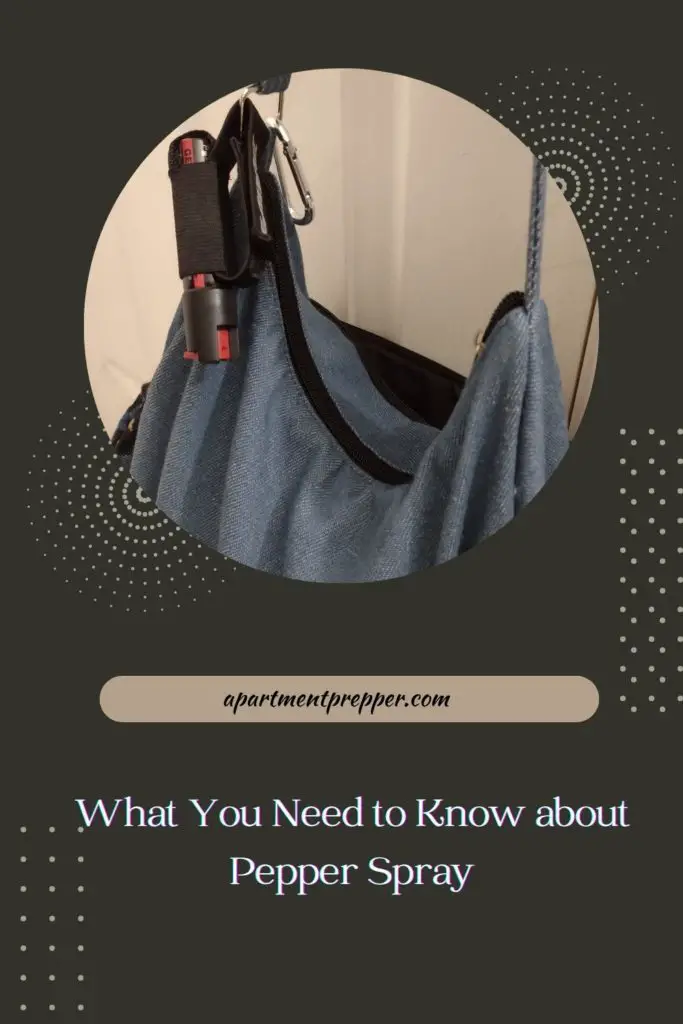Written by Bernie Carr
Over the years, I’ve talked about looking into ways to defend yourself in case of danger. Pepper spray is one of the methods, among others. Before deciding to carry it, let’s look at what you need to know about pepper spray.
What is pepper spray?
Pepper spray is a self-defense tool that uses a chemical compound called oleoresin capsicum (OC), the same agent that causes the heat in chili peppers, as the name implies. It causes inflammation and irritation to the mucous membranes in the eyes, nose, and throat. How does it work? When sprayed, the OC compound causes severe burning and irritation to the eyes, nose, and throat, making it difficult to see and breathe. It will cause coughing, possibly even gagging if severe enough. This can incapacitate the attacker for a short amount of time, giving the victim time to escape or call for help.
How should pepper spray be used?
Pepper spray should be used only in situations where personal safety is threatened. It’s important to aim for the attacker’s face, keeping the spray at least 6 to 8 feet away. After spraying, move away from the area quickly and call for help.
If you are going to carry pepper spray, make sure you learn how to use it first. You also need to have it with you and within easy reach in case you ever need it. There is no point having it in the bottom of your purse or buried in the glove box where you can’t reach it.
Can pepper spray cause permanent damage?
While pepper spray is not lethal, it can cause temporary blindness, and in rare cases, permanent eye damage. It’s important to be cautious when using it and avoid spraying in areas where innocent bystanders could be affected.
How long does the effect of pepper spray last?
The most dramatic effects of pepper spray usually last for 10 minutes, and will gradually lessen. The irritation may last 15 to 30 minutes, depending on the strength of the spray and the individual’s tolerance to the OC compound. Some experts indicate that the burning sensation may even last a lot longer. Asthma sufferers or those with respiratory issues may be more sensitive to these after effects.
What should you do in the event you accidentally spray yourself with pepper spray?
- Stay calm and avoid rubbing the areas that have been sprayed.
- Rinse the areas that were exposed.
- On skin, apply whole milk to provide relief from the burning sensation. Wash the skin with dishwashing liquid (such as Dawn) to remove the oils from the pepper spray then rinse several times.
- If it gets in your eyes, splash with water. Remove your contact lenses if you are wearing them. You can also drop saline solution to help flush out the spray out of your eyes.
- Remove clothing that has been contaminated with pepper spray.
- Wash any clothes that have been exposed to pepper spray.
- If it lingers in the air, move to another area away from it. If the accidental spraying occurred indoors, open all the windows and doors, turn on the ceiling fan or set your home ventilation system to fan.
- If you carry pepper spray, it may be a good idea to also carry pepper spray decontamination wipes, in case you use it can get sprayed by accident.
Is it legal to carry pepper spray?
In most states, carrying pepper spray for self-defense is legal without a permit. However, in some states, there are limitations on the strength of pepper spray that can be carried – pepper spray laws vary by state in the United States. Some states may have restrictions on the strength of the pepper spray, the size or the canister, or may require a permit to carry it. Others restrict the type of vendor who can sell pepper spray, or prohibit the sale of pepper spray to minors. It is important to research and understand the specific laws in your state before using or carrying pepper spray.
Here are some examples of the variety of laws and requirements:
· Massachusetts: Only law enforcement officers and individuals with a firearm identification card can carry pepper spray.
· New York: Pepper spray can only be sold by licensed firearms dealers and can only be used for self-defense purposes. The maximum size allowed is 7 ounces.
· Michigan: Pepper spray can only be purchased by someone over the age of 18 and must contain less than 2% of oleoresin capsicum (OC) concentration.
· Wisconsin: Pepper spray is restricted to a maximum capacity of 60 grams and can only be used in self-defense situations.
· California: Individuals must be over the age of 18 to purchase pepper spray and certain types of sprays are prohibited.
· Washington D.C.: Pepper spray cannot contain more than 2% of OC concentration and can only be used for self-defense purposes.
· Pepper spray is legal and allowed in Hawaii for self-defense purposes, but the pepper spray must have a maximum strength of 2.5 ounces, and it can only be used against animals or humans in self-defense situations.
This is NOT a complete list, merely examples of how the laws can vary. It’s always recommended to check with local regulations or law enforcement agencies to ensure compliance with any rules or restrictions regarding pepper spray use.
What is the difference between pepper spray and bear spray?
Pepper spray is typically used for personal defense against human attackers and contains a lower concentration of capsaicin (the active ingredient that causes irritation to the eyes and respiratory system). Its effects usually last for about 30 minutes and its range is about 10-15 feet.
Bear spray, on the other hand, is specifically designed to deter bears and other wild animals. It contains a higher concentration of capsaicin and can cause temporary blindness, coughing, and difficulty breathing in animals. Its effects can last for about an hour and its range is typically about 20-30 feet.
Pepper spray versus Mace
Pepper spray and Mace are both non-lethal self-defense sprays used to deter an attacker. While they both have the same purpose, they are not the same thing.
Pepper spray is made from Oleoresin Capsicum (OC), a natural chemical compound found in chili peppers. When sprayed, it causes the eyes to close, difficulty breathing, and a burning sensation on the skin, which can last up to 30 minutes.
Mace, on the other hand, is a brand name for a type of pepper spray but is made from a different chemical compound. Mace contains a combination of Oleoresin Capsicum (OC) and Orthochlorobenzalmalonitrile (CS), which causes irritation in the eyes, nose, and throat. The main difference between pepper spray and Mace is the type of chemical compound each uses. Pepper spray is made from chili peppers, while Mace contains a combination of chemicals.
Overall, pepper spray can be an effective tool for self-defense. However, it’s important to use it responsibly, know the rules governing its use in your state, and understand the potential risks involved.
Do you carry pepper spray? Please feel free to share your experience in the comments.
If you found this article interesting or helpful, please consider helping us out (without costing you anything)! We are an affiliate of Amazon.com, which means we received a small commission if you click through one of our Amazon links when you shop, at totally no cost to you. This helps keep the lights on at the blog. Thanks!
About the author
Bernie Carr is the founder of Apartment Prepper. She has written several books including the best-selling Prepper’s Pocket Guide, Jake and Miller’s Big Adventure, The Penny-Pinching Prepper and How to Prepare for Most Emergencies on a $50 a Month Budget. Bernie’s latest e-book, FRUGAL DIY has just been released on Amazon. Her work appears in sites such as the Allstate Blog and Clark.com, as well as print magazines such as Backwoods Survival Guide and Prepper Survival Guide. She has been featured in national publications such as Fox Business and Popular Mechanics. Learn more about Bernie here.
FB: https://www.facebook.com/apartmentprepper
Instagram: https://www.instagram.com/apartmentpreppers/
Twitter: https://twitter.com/AptPrepper
YouTube: https://www.youtube.com/channel/UC7vOtdbo-wiBeBxD6puCr1Q
Pinterest: https://www.pinterest.com/aptprepper/


